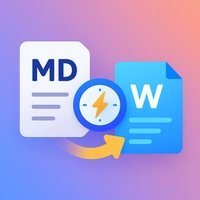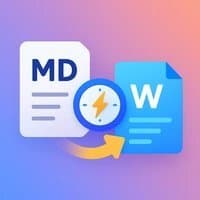A new web-based utility enables instant conversion of Markdown files to professionally formatted Word documents with real-time preview and no login required. Targeting developers and technical writers, it addresses common workflow gaps in documentation sharing while emphasizing privacy and local processing.
For developers and technical teams, Markdown has become the lingua franca of documentation—simple, efficient, and version-control friendly. Yet, sharing these files with non-technical stakeholders often requires conversion to Word (.docx) format, a process that can disrupt workflows with manual reformatting or unreliable tools. Enter the Markdown to Word Converter, a free online tool designed to bridge this gap seamlessly.
Why This Matters for Tech Teams
Markdown excels for code-heavy documentation, but its limitations surface when creating client reports, compliance documents, or collaborative edits requiring Word's advanced features. Traditional conversion methods risk losing formatting, breaking tables, or mishandling code blocks, forcing time-consuming fixes. This tool promises to preserve structure—headers, lists, links, and even syntax-highlighted code—while operating entirely client-side for enhanced security. As one developer noted:
'Automating this conversion removes a tedious bottleneck, letting us focus on content rather than formatting battles.'
Core Features and Workflow Integration
The converter supports two input methods: file upload (for .md or .markdown files up to 10MB) or direct pasting of raw Markdown. Its real-time preview pane allows instant validation, ensuring fidelity before download. Key technical advantages include:
- Zero-Cost & Accessible: No registration, fees, or usage limits—ideal for open-source projects or lean teams.
- Privacy-Centric: Files are processed locally in the browser, not uploaded to servers, complying with GDPR and reducing data exposure risks.
- Formatting Preservation: Faithfully converts complex elements like nested lists, tables, and code snippets. For example:
| Header 1 | Header 2 |
|----------|----------|
| Cell 1 | `inline_code` |
renders identically in Word.
 Instant preview eliminates guesswork during conversion.
Instant preview eliminates guesswork during conversion.
 Drag-and-drop uploads simplify handling large documentation sets.
Drag-and-drop uploads simplify handling large documentation sets.
Implications for Developer Productivity
Beyond convenience, this tool highlights a broader trend: the rise of lightweight utilities that solve niche but painful inefficiencies. For DevOps teams managing docs-as-code, it reduces context-switching between Git repositories and office suites. AI/ML engineers can swiftly share research notes, while cybersecurity analysts might use it for audit reports. Crucially, by avoiding cloud processing, it sidesteps supply-chain risks associated with third-party dependencies—a small but significant win for security-conscious orgs.
 Professional formatting ensures Markdown's simplicity carries into polished deliverables.
Professional formatting ensures Markdown's simplicity carries into polished deliverables.
As documentation grows in strategic importance—from API references to incident post-mortems—tools like this exemplify how targeted innovations can amplify technical communication. For teams drowning in manual tweaks, it’s a reminder that sometimes the most impactful solutions are the ones that quietly handle the unglamorous work.

Comments
Please log in or register to join the discussion